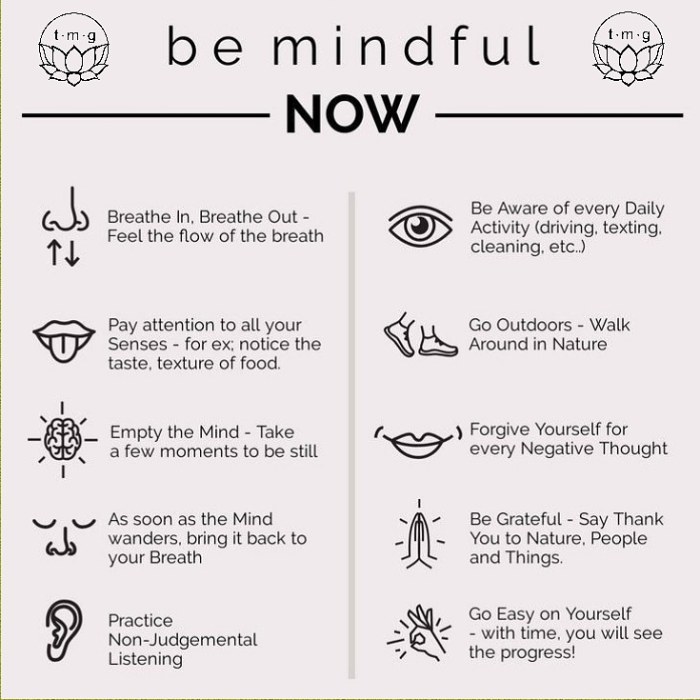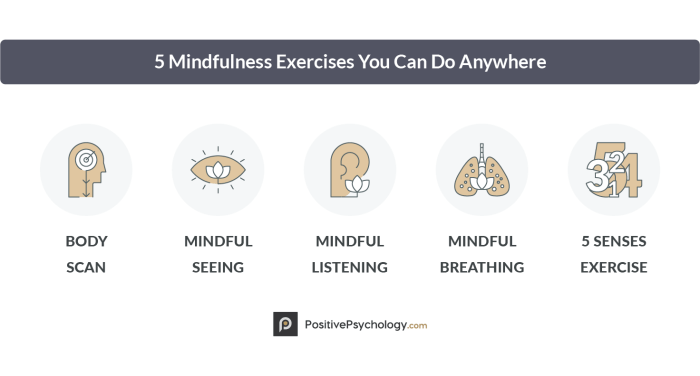Mindfulness Exercises – get ready to dive into the world of mental well-being and mindfulness practices that can transform your daily routine. From reducing stress to enhancing emotional resilience, this guide will walk you through the benefits, types, and incorporation of mindfulness exercises in a cool, relatable way.
Are you ready to explore the power of mindfulness exercises and how they can positively impact your life? Let’s roll!
Benefits of Mindfulness Exercises

Mindfulness exercises are not just a passing trend, they actually offer a wide range of benefits that can positively impact both mental and physical health. Let’s dive into some of the key advantages of incorporating mindfulness practices into your daily routine.
Improved Mental Health
- By practicing mindfulness, individuals can enhance their self-awareness and focus, leading to better emotional regulation and a greater sense of overall well-being.
- Research has shown that mindfulness exercises can help reduce symptoms of depression and anxiety, as well as improve cognitive function and memory.
- Engaging in mindfulness activities can also promote a more positive outlook on life, fostering feelings of gratitude and contentment.
Physical Benefits
- Regular mindfulness practice has been linked to reduced blood pressure and heart rate, contributing to a healthier cardiovascular system.
- Improved sleep quality is another physical benefit of mindfulness exercises, as they can help alleviate insomnia and promote relaxation.
- Individuals who engage in mindfulness activities may also experience decreased levels of chronic pain and inflammation in the body.
Stress and Anxiety Reduction, Mindfulness Exercises
- One of the most well-known benefits of mindfulness exercises is their ability to reduce stress levels by promoting relaxation and a sense of calm.
- Practicing mindfulness can help individuals become more aware of their stress triggers and develop healthier coping mechanisms.
- By focusing on the present moment through mindfulness, individuals can alleviate anxiety related to past or future events, leading to a more peaceful state of mind.
Types of Mindfulness Exercises

Let’s dive into different types of mindfulness exercises to help you stay present and focused in the moment.
Breathing Exercises for Mindfulness
Breathing exercises are a fundamental part of mindfulness practice. These exercises involve focusing on your breath to anchor your attention to the present moment. One common technique is the 4-7-8 method where you inhale for 4 seconds, hold your breath for 7 seconds, and exhale for 8 seconds. This helps calm the mind and reduce stress levels.
Body Scan Meditations
Body scan meditations involve systematically focusing on different parts of your body, starting from your toes and moving upwards. This practice helps increase body awareness and promotes relaxation. By paying attention to physical sensations without judgment, you can release tension and stress stored in different parts of your body.
Mindful Walking
Mindful walking is a form of meditation where you pay close attention to each step you take. This practice encourages you to be fully present in the movement of your body and the sensations in your feet as they touch the ground. Mindful walking can help improve focus, reduce anxiety, and enhance overall well-being.
Incorporating Mindfulness into Daily Routine
To truly benefit from mindfulness exercises, it’s important to incorporate them into your daily routine. By weaving these practices into your everyday life, you can cultivate a sense of awareness and presence that can have a positive impact on your overall well-being.
Morning Routine
Waking up and starting your day with mindfulness can set a positive tone for the hours ahead. Here’s a guide on how to integrate mindfulness exercises into your morning routine:
- Begin by taking a few deep breaths and setting an intention for the day.
- Practice a short meditation to center yourself and focus on the present moment.
- Engage in a mindful movement activity, such as yoga or stretching, to wake up your body and mind.
- Enjoy a mindful cup of tea or coffee, savoring each sip and being fully present in the moment.
Everyday Activities
Mindfulness can be practiced during everyday activities, turning mundane tasks into opportunities for presence and awareness. Here are steps to practice mindfulness during activities like eating or commuting:
- Focus on each bite of your meal, savoring the flavors and textures without distractions.
- Use your commute time to practice deep breathing or body scan exercises to stay grounded and centered.
- Acknowledge your surroundings and engage your senses fully, whether walking, driving, or taking public transportation.
- Take moments throughout the day to pause, breathe, and check in with yourself, bringing awareness to your thoughts and emotions.
Before Bedtime
Incorporating mindfulness exercises before bedtime can help you unwind, relax, and prepare for a restful night’s sleep. Here are techniques to incorporate mindfulness into your evening routine:
- Reflect on your day with gratitude, noting moments of joy, growth, and learning.
- Practice a calming meditation or body scan to release tension and quiet the mind before sleep.
- Avoid screens and create a calming environment in your bedroom to promote relaxation and restful sleep.
- Set intentions for the next day, visualizing a positive and peaceful start to the morning.
Mindfulness and Emotional Well-being
Mindfulness exercises have a profound impact on emotional regulation, helping individuals manage their emotions more effectively. By practicing mindfulness, individuals can learn to observe their emotions without judgment, allowing them to respond to situations in a more calm and balanced manner.
Impact of Mindfulness Exercises on Emotional Regulation
Mindfulness exercises, such as deep breathing and body scans, can help individuals regulate their emotions by increasing self-awareness and promoting a sense of calmness. These practices enable individuals to identify their emotions as they arise and choose how to respond to them mindfully.
Benefits of Mindfulness in Coping with Difficult Emotions
Mindfulness exercises provide individuals with the tools to cope with difficult emotions by teaching them to acknowledge and accept their feelings without becoming overwhelmed by them. By cultivating a non-judgmental attitude towards their emotions, individuals can navigate challenging situations with greater ease.
Connection Between Mindfulness and Emotional Resilience
Practicing mindfulness regularly can lead to increased emotional resilience, allowing individuals to bounce back from setbacks and difficult emotions more effectively. Mindfulness helps individuals build the mental strength needed to face adversity and maintain a positive outlook even in the face of challenges.
